
 |
|
Македонија-Историја и Иднина |
Внеси реплика 
|
страница <12345 18> |
| Автор | |
marco_antony 
Сениор 
Регистриран: 17.Јули.2006 Локација: Macedonia Статус: Офлајн Поени: 11062 |
 Опции за коментарот Опции за коментарот
 Благодарам(0) Благодарам(0)
 Цитирај Цитирај  Одговор Одговор
 Испратена: 23.Јануари.2008 во 19:23 Испратена: 23.Јануари.2008 во 19:23 |
|
Kartata vo prilog e edna od 4-te mermerni mapi sto se naogjaat vo Rim na zidna ploca na stranata na ulicata Via Imperiali koja sto vodi od Colloseo Romano do rimskite forumi (Foro Romano, Foro Traiano i dr.). 4-te mapi se oznaceni so razlicni vremenski periodi koi go oznacuvaat pojavuvanjeto i podemot na gradot-drzava Rim od najrano vreme od nekade 700-800 godini pred Hrista pa navamu. Interesnoto za nas e toa sto barem na 3 od ovie 4 mermerni mapi stoi jasno ispisano imeto Makedonija (i toa vo vremeto koga rimskata drzava se sostoela samo od gradot Rim); voedno, Makedonija e oznacena nastrana=razlicno od imeto Grcija koja vo najgolem del od mapite ne e nitu narecena kako Grcija tuku Egej, Epir i sl. Znaci, vistinata za Makedonija i za nas koi ziveele i ziveeme vo nea lezi na dofat na rakata, so brojni artefakti i istoriski crtezi i zapisi od damnina, samo treba da se potrudime tie fakti da se soberat, sistematiziraat i soodvetno prezentiraat kako takvi na site vo svetot. Изменето од marco_antony - 23.Јануари.2008 во 19:27 |
|
|
|
|
 |
|
Boogie 
Профил од член
Испрати лична порака
Најди пораки од член
Посети го сајтот на членот
Додај во листа на пријатели
Модератор 

Слобода или Смрт Регистриран: 26.Октомври.2005 Статус: Офлајн Поени: 10652 |
 Опции за коментарот Опции за коментарот
 Благодарам(0) Благодарам(0)
 Цитирај Цитирај  Одговор Одговор
 Испратена: 25.Јануари.2008 во 10:15 Испратена: 25.Јануари.2008 во 10:15 |
|
МУЗЕЈ НА МАКЕДОНИЈА
Неколку нови документи, факсимили од писма, лични предмети, карти,
насликан портрет, за прв пат се презентираат пред македонската јавност,
благодарение на неколкугодишното истражување на Мирјана Нинчовска, виш
кустос во Историскиот оддел на Музејот на Македонија. Изложбата е по
повод 130 години од двомесечната слобода на Пијанец и 110 години од
смртта на познатиот војвода.
- Донесена е голема архивска граѓа за истражување, но потребни се средства. Но, полека се откриваат и се доразјаснуваат сите процеси и личности, додава историчарот. Авторот на концепцијата, Мирјана Нинчовска вели дека личните предмети на Малешевски и биле поттик да почне да го истражува неговот лик и дело. - Претставена е и фотографија на Илија Марков Поп-Георгиев со неговата сопруга, потоа сликан е и непосредно пред својата смрт. Оваа изложба е значајна, бидејќи Малешевски првпат се обработува од музејски аспект, вели Нинчовска.
Анита ЈОВАНОСКА Фото: Д.АНДОНОВСКИ |
|
 |
|
naemnik 
Сениор 

Регистриран: 09.Ноември.2006 Статус: Офлајн Поени: 658 |
 Опции за коментарот Опции за коментарот
 Благодарам(0) Благодарам(0)
 Цитирај Цитирај  Одговор Одговор
 Испратена: 25.Јануари.2008 во 10:59 Испратена: 25.Јануари.2008 во 10:59 |
|
Taken from the libraries of the Bulgarian Exarchar Kiril
The first Constitution of Macedonia - Kresna 1878 by The Macedonian Rebel Committee The Begining Page of the Constitution: 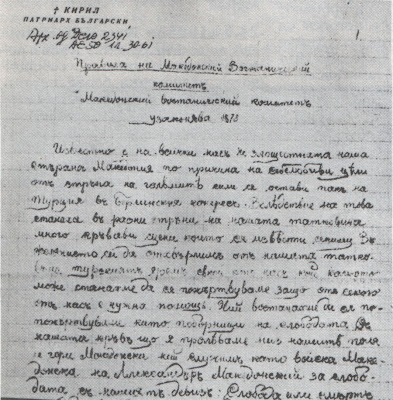 Translation: “With the wish to cast off the Turkish bondage from our fatherland, each and every one of us stands ready to sacrifice whatever is necessary. We have rebelled as champions of freedom. By shedding our blood throughout the fields and forests of Macedonia, we serve as the Macedonian army of Alexander the Great. We fight for freedom and our motto is: "Freedom or Death!" 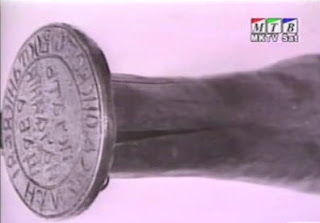 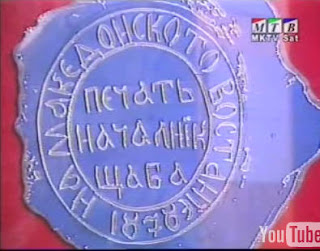 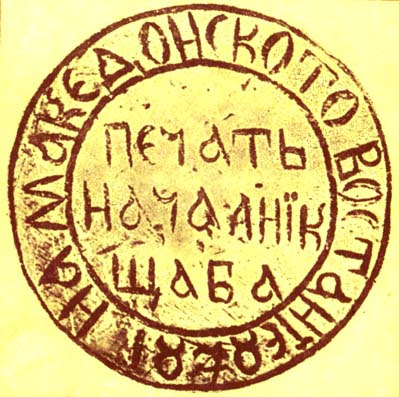 And Dedo Iljo Vojvoda and his proclamation of the Kreshna Uprising Here is his Proclamation before the Uprising began: 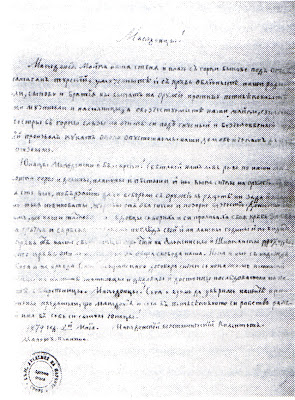 “Macedonian's! Macedonian's our mother rose up and cry with bitter yell under Turkish fire and yatagan. Our parents blood is shed, sons and brothers are calling to take up our arms against fife century's enslavers and violators, and our abused mothers, wifes and sisters are under the unbearable and inhuman Turkish behavior are crying upon our devastated homes and are waiting for our response. Macedonian and Bulgarian Hero's! Our holy Lion is roaring through our Macedonian forests and valleys and is calling us all to take up arms. Where ever you are, hurry up to getter together with our weapons in our arms, to save those innocent victims from this filthy and spiteful humiliation. Remember that our fathers spill their blood for Greek and Serb freedom [...] Look upon the last year events and you shall see that blood from our [....] still stand on Aleksandrian and Shipanian passage, which blood they did not spare for our freedom... Macedonians! Now is the time to convince our educated betrayers, that Macedonia even after fife centuries of slavery still can give a birth and still have inside it self Sons Hero's! 2nd of May 1879 Malesh Mountain Macedonian Uprising Committee.” Taken from: Научен архив, Българската академия на науките, София, (НА-БАН-С),Фонд: Сбирка IX, оп. 1, а.е. 55, л. 1. Изменето од macedon_alex - 20.Мај.2009 во 17:30 |
|
 |
|
m__g__ 
Сениор 
Регистриран: 22.Август.2006 Статус: Офлајн Поени: 591 |
 Опции за коментарот Опции за коментарот
 Благодарам(0) Благодарам(0)
 Цитирај Цитирај  Одговор Одговор
 Испратена: 25.Јануари.2008 во 11:27 Испратена: 25.Јануари.2008 во 11:27 |
|
Македонцы!
Македониїя майка наша станА й плаче съ горки выкове подь огънтъ и іатаганъ турскій. Умученнытъ и съ крвъ облеаны наши родители, сынове и братя ньі выкагъ на оружіе противъ петвЬковнитЬ наши мучители и насилницы, а обезчестеныте наши майки, супруги и сестры съ горкы солЬзи на очитЬ си подъ гнусный й безчеловЬчный турскій произволъ кукатъ около опустошаемй наши домове и чекать да имъ се отзовеме. Юунаци Македонски й Бъгарски! СвЬтлый нашъ левъ реве по наши македонски гори и долины, планины и пустины и ны вика сички на оружіе. ГдЬ и да сте вы, побързаіте да се собереме съ оружіе въ рАцетЬ ни, за да ги избавиме тыА невиноваты жъртвьі отъ ова гнусно и позорно безчестіе. Донесете си на умъ шо наши татковцы й дЬдовцьі се бориха и си проливаха своа кръвъ за свобода гръчка и сьрбска... ПоглЬдъ свой и на ланскн годины и ке видите, шо кръвъ отъ наши... оψе стои на Алексинскиы и Шипканскы проходы, коҗто кръвъ они не пожалЬха за обψа свобода наша... Македонцы! Сега е време да увЬриме нашитЬ просвЬтены предатели, ψо Македонiæ й сега в петьвЬковното си робство ражда и има въ себе си сынове юнацы! 1879 год. 2-й Маіа Малешъ-Планина Македонскій возстанническій Комитетъ". Извор: Научен архив, Българската академия на науките, София, (НА-БАН-С), Фонд: Сбирка IX, оп. 1, а.е. 55, л. 1. Изменето од macedon_alex - 20.Мај.2009 во 17:34 |
|
 |
|
naemnik 
Сениор 

Регистриран: 09.Ноември.2006 Статус: Офлајн Поени: 658 |
 Опции за коментарот Опции за коментарот
 Благодарам(0) Благодарам(0)
 Цитирај Цитирај  Одговор Одговор
 Испратена: 25.Јануари.2008 во 12:13 Испратена: 25.Јануари.2008 во 12:13 |
|
Zbore za Krvta na tie sho go vodat Vostanieto u ovaj sluchaj KRESHNA, i se borile isto i tam kaj Aleksandrijski i Shipinski Prohodi!!! Od Brat mu na Iljo Malesheski, Popgeorgiev Berovski e sostaven i USTAVO, pa chitaj: 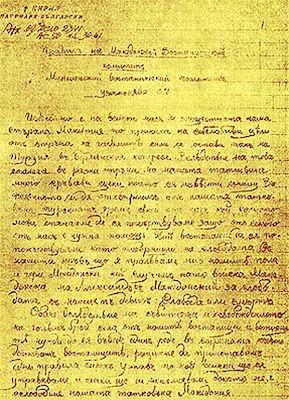  A VO CRKVATA KADE SHTO GO VODAT I PRVOTO VOSTANIE, RAZLOVCI - BEROVSKO mozhesh da idesh i da videsh sho ima tamu, ama za da imash predstava sho da trazhes, eve ti pa vidi: 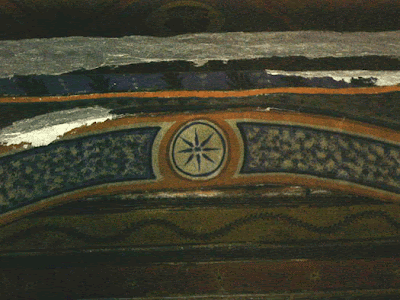 LICHNO GO IMAM VIDENO !!! Изменето од macedon_alex - 20.Мај.2009 во 17:50 |
|
 |
|
naemnik 
Сениор 

Регистриран: 09.Ноември.2006 Статус: Офлајн Поени: 658 |
 Опции за коментарот Опции за коментарот
 Благодарам(0) Благодарам(0)
 Цитирај Цитирај  Одговор Одговор
 Испратена: 25.Јануари.2008 во 12:19 Испратена: 25.Јануари.2008 во 12:19 |
|
GRCITE NEMAT IZBOR, ONI SA SI ZNAJALE SHO E KAKO E, I IMA OSHE GRCI SHO SA NORMALNI, A NE FASHOS, I ZNAAT DA CHITAT I GLEDAT SHO NIVNITE SA PISHUVALE.
JA TI PRIMER NA GRCHKI ISTORICHAR, NASLEDNIK NA PAVLOS MELAS, NASLEDNIK NA NAJGOLEMIO UBIEC NA MAKEDONSKI CIVILI U GRCHKATA ISTORIJA: 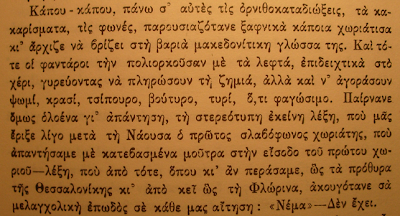 Translation from Greek: Occasionally, up by chicken-chasing, the cackle, the sounds, all of a sudden a village woman would appear and start to curse in her own heavy(difficult) macedonian language.The soldiers offered her money, and searched for whom they should compensate for the damages, and also to buy bread, wine, tsipuro, butter, cheese and other eatables. Instead they got in return the same stereotypical answer, that they first heard outside Nausa where they met the first slavic speaking villager, who answered us with his head bent down, the answer we got wherever we went, from the outskirts of Thessaloniki and all the way to Florina, it was the same melancholic answer to all our demands: Nema, there is none. Taken from "Oi Polemoi 1912-1913" by Spirou Mela from 1972. Изменето од macedon_alex - 26.Мај.2009 во 15:11 |
|
 |
|
Vladimir88 
Сениор 

"Arbeit macht frei" Регистриран: 20.Декември.2007 Статус: Офлајн Поени: 4349 |
 Опции за коментарот Опции за коментарот
 Благодарам(0) Благодарам(0)
 Цитирај Цитирај  Одговор Одговор
 Испратена: 25.Јануари.2008 во 15:18 Испратена: 25.Јануари.2008 во 15:18 |

Makedonskoto zname na makedonskata kolonija vo S. Peterburg so Bucefal, konjot na Aleksandar Makedonski, i sonce vo izgrev so zlatesti bukvi: „EDINSTVENA NEZAVISNA MAKEDONIJA“ (mart 1914) Изменето од macedon_alex - 26.Мај.2009 во 15:15 |
|
 |
|
Boogie 
Профил од член
Испрати лична порака
Најди пораки од член
Посети го сајтот на членот
Додај во листа на пријатели
Модератор 

Слобода или Смрт Регистриран: 26.Октомври.2005 Статус: Офлајн Поени: 10652 |
 Опции за коментарот Опции за коментарот
 Благодарам(0) Благодарам(0)
 Цитирај Цитирај  Одговор Одговор
 Испратена: 04.Февруари.2008 во 12:25 Испратена: 04.Февруари.2008 во 12:25 |
|
As for the ancient Macedonians being Greek? First, for a Macedonian, especially for a Macedonian soldier, there was no greater honour than being Macedonian. So, why would they want to be any less? As for being Greek, the word "Greek" was not invented until the Roman times, so how could they be Greek? Lastly, just because modern Greece decided to associate itself with the non-existent so called "ancient Greece" that does not mean that modern Greeks have the right to claim the ancient Macedonian heritage. Just because some modern Greek said koine was a Greek language it doesn't make it so. More than fifty percent of the words in the koine language are similar to those of today's Macedonian language. How do you explain that? So my foolhardy Greek friends GIVE IT UP, Macedonia has always belonged to and will always belong to the Macedonians. What you were taught to believe, by your modern Greek progenitors, was only a 19th century myth, the dream of a few mad men, a dream that has turned into a nightmare for all of us. References: Josef S. G. Gandeto, Ancient Macedonians, The differences Between the Ancient Macedonians and the Ancient Greeks, Writers Showcase, New York. M. M. Austin, The Hellenistic World from Alexander to the Roman Conquest, London, Cambridge University Press, 1981 F.W. Walbank, The Hellenistic World, Fontana History of the Ancient World, Fontana Press, 1992. Peter Green, Alexander to Actium, The Historical Evolution of the Hellenic Age, University of California Press, Berkley Los Angeles, 1990. Peter Connolly, Greece and Rome at War, Macdonald Phoebus Ltd, 1981. |
|
 |
|
Boogie 
Профил од член
Испрати лична порака
Најди пораки од член
Посети го сајтот на членот
Додај во листа на пријатели
Модератор 

Слобода или Смрт Регистриран: 26.Октомври.2005 Статус: Офлајн Поени: 10652 |
 Опции за коментарот Опции за коментарот
 Благодарам(0) Благодарам(0)
 Цитирај Цитирај  Одговор Одговор
 Испратена: 20.Март.2008 во 19:48 Испратена: 20.Март.2008 во 19:48 |
|
еве уште влачки НЕПОБИТНИ ДОКАЗИ
Византискиот писател Георги Акрополит (13. век) наведува кои градови ги уништувал бугарскиот цар Калојан во 1206 - 1207 година. Тој пишува: "Серес во минатото бил многу голем град, но Бугаринот Јоан (Калојан, з.м.) го разрушил до темел" ("Бугарската воена уметност за време на феудализмот", 1958, стр. 414). Веќе во 14 век, поранешниот византиски император, Македонецот Јован Кантакузин, опишувајќи ги нападите на бугарскиот цар Михаил Шишман во 1323 година, пишува: "Овде била целата војска од запад - македонската и тракиската, сите тие кои биле во градовите на исток под власта на Ромеите" (исто, стр. 428). Многу често името на Македонија го спомнуваат и западните хроничари, но за да не го оптоваруваме текстот, овде ќе изложиме само некои од нив. Алберт Аквински (12 век) во делото "Историја", следејќи го патот на крстоносецот гроф Вилхем, од Алвон на Јадранското Море, пишува: "Откако се симнал на копното, тој отишол во градот Солун, кој се наоѓа во областа Македонија" (ГИБИ, т. 8., стр. 164). Од истиот период е и таканаречениот "Пегавски летопис", во кој бил опишана Третата крстоносна војна, на чело со Фридрих Барбароса. Откако неговите војски поминале преку Ниш и Софија, тие стигнале до "...Филипол, најголемиот град во Македонија" (исто, стр. 205). Да спомнеме и дека македонските писатели од тоа време, исто така, знаеле дека му припаѓаат на народ, кој е различен од соседните Бугари, Грци и Срби. Така, на пример, нашиот прв печатар, кој во 1560 година отпечатил Псалтир, за себе напишал: "Јас, Јаков од пределите на Македонија, од местото наречено Софија." (М. Дринов: "Сочиненија, т. 2, стр. 495). Македонецот Јаков не ја распространувал својата книга во Бугарија, туку само во Македонија и затоа во неговиот "Псалтир" од 1570 година, им се обратил на читателите со зборовите: "Ако некој посака од оваа света книга, сите се доставени кај Каратрифун во Скопје (исто, стр. 497). |
|
 |
|
tofu 
Сениор 
Регистриран: 01.Февруари.2008 Статус: Офлајн Поени: 328 |
 Опции за коментарот Опции за коментарот
 Благодарам(0) Благодарам(0)
 Цитирај Цитирај  Одговор Одговор
 Испратена: 27.Март.2008 во 11:56 Испратена: 27.Март.2008 во 11:56 |
|
ДНК истражувањето за Македонците
Погледнете го: http://www.historyofmacedonia.org/ConciseMacedonia/AncientGenes.html http://www.makedonika.org/processpaid.aspcontentid=ti.2001.pdf http://www.historyofmacedonia.org/ConciseMacedonia/Y-chromosomes.html Изменето од tofu - 27.Март.2008 во 11:56 |
|
|
It’s just unbelievable how many people think their version of reality is the only one that exists.
|
|
 |
|
mamamd 
Сениор 
Почесна конзулка Регистриран: 02.Ноември.2007 Статус: Офлајн Поени: 25679 |
 Опции за коментарот Опции за коментарот
 Благодарам(0) Благодарам(0)
 Цитирај Цитирај  Одговор Одговор
 Испратена: 04.Август.2008 во 08:09 Испратена: 04.Август.2008 во 08:09 |
|
... segashnost..realnost...
....prezemeno od Dnevnik... Со куќата на Карев ловат политички поени Под заштита е само плочата, но не и објектот, вели Ставре Карески, потомок на војводата, кој со свои пари ја одржува куќата со историска важност
Освен плочата што ја поставија пред избори со натпис
дека куќата е споменик под заштита и дека во неа живеел Никола Карев,
државата не дала ни денар за нејзино одржување, вели Ставре Карески
(61) од Крушево, подалечен потомок на претседателот на Крушевската
Република, кој има чест да живее во куќата каде што војводата поминал
дел од својот живот.„Да не го правите ова само за избори“, ги прашав
претставниците од Министерството за култура, кои во 2006 година свечено
ја открија плочата на фасадата. Рекоа: „Не, ние ќе бараме пари од
министерот за да се реставрира надворешниот лик на куќата“. Но, до
денес никој не ни дал ни денар. Се извитка и плочата што ја поставија -
вели Карески. Тој со свои пари ги зачувал нејзиниот автентичен
внатрешен и надворешен изглед, со мали корекции. За разлика од овој
објект, куќата каде што се родил Карев, поради дотраеност била срушена,
а на нејзино место изградена нова, со поинаков изглед. ...na ova i nema shto da se dade komentar...ova e nashata realnost...ova e nashata vistina... |
|
 |
|
Boogie 
Профил од член
Испрати лична порака
Најди пораки од член
Посети го сајтот на членот
Додај во листа на пријатели
Модератор 

Слобода или Смрт Регистриран: 26.Октомври.2005 Статус: Офлајн Поени: 10652 |
 Опции за коментарот Опции за коментарот
 Благодарам(0) Благодарам(0)
 Цитирај Цитирај  Одговор Одговор
 Испратена: 27.Октомври.2008 во 00:27 Испратена: 27.Октомври.2008 во 00:27 |
|
Правнукот на Дончо Штипјанчето по 50 години живеење во Турција дојде во Македонија
 Со
ова решение, по половина век живот во Турција, 58 годишниот Боро
Чамушев, правнук на опеаниот во песните штипски и македонски
револуционер - современик на Гоце Делчев, комитата Дончо Штипјанчето,
доби македонски пасош.
„Јас денеска дојдов во Штип за да извадам пасош оти во Турција го
изгубив“ – вели Боро Чамушев, правнук на македонскиот револуционер
Дончо Штипјанчето.
Освен што за годиниве Чамушев македонското државјанство го сменил со турско, го сменил и идентитетот.
Таму е пензионерот Месу Бора. Со едвај разбирлив македонски јазик Боро ја дораскажа својата животна приказна.
|
|
 |
|
Тречи 
Сениор 

Царевићот Регистриран: 22.Декември.2008 Статус: Офлајн Поени: 414 |
 Опции за коментарот Опции за коментарот
 Благодарам(0) Благодарам(0)
 Цитирај Цитирај  Одговор Одговор
 Испратена: 13.Јануари.2009 во 21:27 Испратена: 13.Јануари.2009 во 21:27 |
|
18th king of Macedonia (359–336 bc), who restored internal peace to his country and then, by 339, had gained domination over all Greece by military and diplomatic means, thus laying the foundations for its expansion under his son Alexander III the Great.
Early life and accession Philip was a son of Amyntas III. In his boyhood he saw the Macedonian kingdom disintegrating while his elder brothers Alexander II and Perdiccas III, who each reigned for a few years, strove unsuccessfully against insubordination of their regional vassal princes, intervention of the strong Greek city Thebes, and invasion by the Illyrians of the northwest frontier. Philip himself spent some time as a hostage at Thebes, the leading city (with Athens) of this decade (370–360 bc), where the great Epaminondas, the most inventive tactician of all Greek generals until then, was in charge of the best army in Greece. These were probably the most formative years of Philip’s education. When he returned to Macedonia his brother Perdiccas soon found him ready for a command. Philip came to the throne suddenly and unexpectedly in 359, when Perdiccas was killed meeting an Illyrian invasion. The Illyrians prepared to close in; the Paeonians were raiding from the north, and two claimants to the throne were supported by foreign powers. In this crisis Philip showed a good sense of priorities by buying off his dangerous neighbours and, with a treaty, ceding Amphipolis to Athens. He used the time gained in military preparations. The army that later conquered Persia was developed all through his reign, but the decisive innovations in arms—the sarissa, a pike nearly half as long again as the spear of the Greeks—tactics, and training belong probably to this first year. Macedonian expansion In 358 he invaded Paeonia, and then he defeated the Illyrians decisively, in a battle that already suggests a master of war. The next year his marriage with Olympias, the Molossian princess of Epirus (the mother of Alexander the Great), helped to stabilize his western frontier. Now he ventured to antagonize Athens by recapturing Amphipolis, the strategic key securing the eastern frontier and giving access into Thrace; and in 356 he took the west Thracian Crenides (renamed by him Philippi), a place newly founded to exploit new finds of silver and gold in Mount Pangaeum. These successes frightened his neighbours into forming a coalition against him, which was joined by Athens; but it achieved nothing. The 10-year “war for Amphipolis” with Athens showed that the Athenians, with all their naval power, were quite unable to damage the continental and military power of Macedonia or even to save their own allies from Philip’s attacks. Meanwhile he twice penetrated deeply into Thrace. And in the south a Thessaly divided against itself gave him an entry into Greece. These same 10 years saw central Greece immersed in the Sacred War to liberate Delphi from its occupation by the Phocians, enabling Philip to intervene as the ally of Thebes and the Thessalian League of city states. His only great defeat in the field came in Thessaly in 353, owing (it seems) to overconfidence and failure of reconnaissance. The next year he retrieved it with a spectacular victory, which forced the Athenians to occupy Thermopylae and bar his path to the south. Presidency of the Thessalian League Characteristically, Philip declined the trial of strength, prepared to wait for six years until he could gain Thermopylae by negotiation and without striking a blow. Meanwhile his Thessalian victory earned him election as president (archōn) of the Thessalian League (probably 352), a position unique for a foreigner in a Greek confederation and one that was to bind Thessaly to the kings of Macedonia for 150 years and more. Philip’s capture of Olynthus and annexation of Chalcidice in 348, enslaving the Olynthians and other of the Chalcidians, was disquieting to many. The Greeks themselves occasionally were brutal to small cities, but Olynthus was a large city. Philip’s enemies could affect a high moral tone and contempt for a barbarous Macedonian, but even his friends might have wondered whether he ought to be allowed into the heart of Greece with an army. Yet there were many ways in which he could serve them. Particularly, he could finish the Sacred War, which the Thessalians, Thebans, and others still could not finish for themselves. Athens could not prevent this now and had reason to fear that Philip’s next campaign in Thrace (346) might challenge its own control of the sea route to southern Russia, its main source for imported corn. Significantly, however, it was Philip, and not Athens, who made the first overtures for peace, though all the military initiatives lay in his own hand. His plans for the future, in Greece and farther afield, included Athens as a willing ally, not as a defeated enemy. Even before the peace with Athens was ratified (346), the Athenian publicist Isocrates was inviting Philip to reconcile the four leading cities of Greece and to lead a united Greek alliance in a war of expansion against Persia. A step in this direction was Philip’s intervention now to end the Sacred War, in recognition of which he was admitted to membership of the Delphic Amphictyony—an association of neighbouring states. The votes of the Thessalians and their clients gave him a control of its council, which could be used on occasion for political and diplomatic ends. He lost no opportunity in the next years (346–343) of penetrating Greece without war, by winning and buying friends among the politicians of the smaller cities and intervening occasionally with subsidies or a force of mercenaries in their local disturbances. This policy made him some enemies, too, and it played into the hands of the great orator Demosthenes and others at Athens. Demosthenes saw Philip now as a bar to Athenian greatness and a threat to its freedom and existence; he talked tirelessly to warn the Athenians of the danger and to convince the Greeks in general that it was their danger too. Philip in these years conciliated Athens in small ways even under provocation, but he came to see that Demosthenes and the anti-Macedonians were beyond conciliation (343–342). Meanwhile, he reasserted his suzerainty over the neighbouring Illyrians, tightened his grip on Thessaly, and in 342 began the series of campaigns in Thrace that enabled him in two years to annex great parts of it as a province, and finally to demonstrate his power against the Scythians settled on the southern banks of the Danube Delta. The events in Thrace caused two of his Greek allies, the cities of Perinthus (later called Heraclea, present-day Marmaraereğlisi) and Byzantium, to review their position, and his coercion of them led to the two great sieges that showed the development of his artillery and allied arms, of which his son Alexander was to make greater use in Asia. The declaration of war by Athens in 340 enabled him to raise the two sieges without undue loss of face, though he had failed to establish a threat to the Athenian corn route to southern Russia. Athens was to be intimidated now by invasion of its territory through central Greece, where the key position was held by Thebes, his ally hitherto, but of late a dissatisfied and recalcitrant one. His services to it in the Sacred War had been more than offset by his new position as its successful rival for leadership in and through the Amphictyony, and his moves toward hegemony in Greece could be seen in Thebes as encroachments. Victory of Chaeronea When Philip swept south with his army in November 339, he hoped to rush the Thebans into honouring their alliance and letting him through into Attica. The Thebans listened instead to Demosthenes and to their own instinct of self-preservation. The Greek alliance became something formidable with the accession of Thebes, and Philip was forced, as a contemporary orator put it with only a mild exaggeration, “to stake his all on the issue of one short day.” Chaeronea was a famous victory, gained by decisive blows of Philip’s cavalry. His real skill as a general can be seen, though dimly, in a manoeuvre of controlled retreat aimed at dislocating the advancing Greeks and creating gaps for the cavalry to strike. By winning this battle he had won the war. In the various peace treaties with the Greek states, Thebes had to admit a Macedonian garrison, and its democratic constitution was replaced by a pro-Macedonian government; but Athens suffered neither invasion of its territory nor interference with its democracy and was not disarmed by dismantling of the walls or surrender of the navy. For Philip, Athens was the one Greek state from which he needed not neutrality or unwilling alliance but active cooperation. All past experience had shown that wars against Persia succeeded only when the Persians were denied the use of the Aegean, and for this the great Athenian navy was the first need. In Greece (outside Thessaly), Philip could have had no illusions about his own unpopularity, except among those of the well-to-do who were attracted by his court and his patronage; some cities also (especially the neighbours of Sparta) were glad to lean on Macedonia for support against an ancient enemy. Philip intended to involve all the Greeks with the Persian war. So Isocrates had advised him eight years before; but on the details of the ways and means he had no advice to offer. Philip himself organized the Greeks now to keep the peace with him and with each other and to support him in the Persian war overseas. In the constitutional details of his settlement of Greece he may well have had the help of Aristotle, free from his recent duties as tutor of the young Alexander. The League of Corinth Philip’s so-called League of Corinth, established in 337, was an organization designed to preserve and perpetuate a general peace (koinē eirēnē), inaugurated when the delegates of all the states of Greece (except Sparta) and the islands swore to abide by it and to recognize Philip as president (hēgemōn) for this purpose. The general peace was a political innovation of the Greeks themselves, used several times in the past 50 years in attempts to stabilize affairs while promoting this or that hegemony. The peace had never lasted long because the leading Greek states had neither the power nor the mutual trust to create an effective organization for collective action against aggressors. Philip designed a council of representatives from all the states (synedrion), which was empowered to deliberate and decide on action to be taken in the event of the peace being broken or threatened. After the decisions were made, their execution lay with Philip as hēgemōn. The states were under obligation to supply troops or ships to the hēgemōn on demand, by quotas corresponding to their voting power on the council. Though neither Philip nor Macedonia had representatives on the council, it was the knowledge that the hēgemōn had the power of Macedonia in his hand that made this organization effective. As it happened, Corinth, where the inaugural meeting was held, was one of only three Greek cities with a Macedonian garrison, a fact the significance of which can have been lost on nobody. Last years Philip was wise, no doubt, to build on the foundation of the earlier practice of the Greeks themselves and also to refrain from organizing them in any permanent alliance that would have recalled too much the unpalatable experiences of the past. He was not, however, a Greek politician or even a Greek, but king of the Macedonians; and he cannot possibly have seen the settlement of Greece—as most modern historians have seen it—as the culmination of his life’s work. For him it culminated nothing and was not even an end in itself but only a means. Chaeronea had brought the Greeks to order, and his plans required that they should stay in order now. The synedrion at Corinth heard his program for a Persian war and duly acclaimed it early in 337. Early the next year an advance force of the Macedonian army crossed to Asia Minor. Philip would lead the grand army into Asia presently, and the Greeks would be with him. This meteor fizzled out. The subtle, pliant, patient, calculating diplomatist, master of timing in politics and war, ended his life in a tale of irresponsible incompetence. The historian Theopompus, who saw Philip at close quarters, made much of his vices, his love of drink and debauchery, and his wild extravagance with money. Allowance made for this notably faultfinding and puritanical writer, Philip’s character did contain some real ambiguities, extending into his domestic life. His “political marriages” were mostly opportune symbols of goodwill toward princes or groups worth conciliating, but his last marriage, in 338, to the Macedonian Cleopatra, led to a final break with Olympias, his queen, who left the country accompanied by the crown prince Alexander. Though Olympias was unpopular at court and though Cleopatra’s connections were powerful and important, it was not “politic” to put the succession in jeopardy. Philip showed that he had never intended this result, by taking trouble to be reconciled with Alexander. The tradition that makes him infatuated with Cleopatra is probably right. If so, he misjudged fatally the amount of harm that could be done by marrying her. With the preparations far advanced for the crossing into Asia, at the grand celebration of his daughter Cleopatra’s marriage to Alexander of Epirus (brother of Olympias), Philip was assassinated by Pausanias, a young Macedonian noble with a bitter grievance against the young queen’s uncle Attalus and against Philip for denying him justice. This was the official explanation, and Pausanias himself could add nothing to it; he was killed on the spot. Suspicion fell on Olympias and Alexander, those with most to gain from Philip’s death, and many modern interpreters have followed it. Aristotle, however, clearly did not believe it. In his Politics a few years later he used this incident as an example of a monarch murdered for private and personal motives—which would have been a puerile indiscretion if either he or the world in general had ever taken the canard seriously. Assessment So ended, unworthily, the first of the great Macedonians. Everything known about him comes from Greek sources, which concentrate on his impact upon the Greeks and their history. Yet even more impressive, in view of Macedonia’s troubled and undistinguished past, would be the full story of his unification and expansion of his own kingdom; his control of its regional princes, nobles, and gentry and their retainers, to form a great Macedonian people, symbolized by the finest army the world had seen; and his continuing attrition by warfare and diplomacy, which in some 20 years reduced much of the Balkan peninsula to subservience. The apparently untidy record of his campaigns into Illyria or Thrace and of his interventions with diplomacy or arms (or both) in Thessaly, Euboea, and the Peloponnese, which might suggest that repetition is a sign of incompetence, seem better interpreted as the work of a strategist operating always on several fronts, often preferring diplomacy to war, limited objectives to the grandiose, the smaller risks to the greatest; especially never forgetting that there is always another day. His decisive day at Chaeronea came, in a sense, because his true policy in Greece had failed, thanks partly to Demosthenes. But probably to take control of Greece without a Chaeronea was a real impossibility at this date (or indeed later). Though Philip certainly wanted to be acceptable in Greece and did attract many important Greeks to his court, his philhellenism has been overrated: Olynthus and other Greek cities knew better. Though he cultivated the Athenians for reasons of high policy, there is no evidence that he ever in his life set foot in Athens, a remarkable piece of insouciance at every level. Pella, his capital, had long been a resort or refuge of great men of letters, and under Philip the connection with Plato’s Academy was preserved, Theopompus was entertained, and Isocrates was invited; the leading actors of the Athenian stage appeared in Macedonia, too. Aristotle, whose father had been physician to Amyntas, Philip’s father, spent three or four important years as Alexander’s tutor. Philip presumably was at home with these people, but tradition says nothing of him as a man of letters himself or as an intellectual, though as an orator he could impress a party of Athenians that included Demosthenes and Aeschines and other professionals. His charm was great; he was by nature convivial, hospitable, and a bon viveur. Undoubtedly he drank too much and too often, with the saving grace that he was known to listen to home truths even when drunk. As a commander in the field he was unwearying, and in action he fought like a lion; in the end he was really disfigured with old wounds. He was a general perhaps not of genius but of a very high order, with the tactical skill to coordinate the cavalry and infantry arms which were largely of his own creating. Making and training over the years a great army, he was paradoxically sparing and even cautious in using it. If he had survived to invade Asia, it would not have been to overthrow the Persian Empire. He might have established a Macedonian empire in Asia, perhaps, but it would have been a Mediterranean empire in character. The Greeks would have benefitted by colonization, but the problem of Greek freedom would have remained, with the political domination of the higher culture by the lower. Philip was aware of the problem, and the League of Corinth, with its facade of freedom, was his answer. It did not deceive the Greeks or satisfy them; but no later Macedonian king could improve on it. Philip had made Macedonia, and now Macedonia and its kings made world history. Additional Reading The major ancient history of Philip and his age, Theopompus, Philippica, in 58 volumes, survives only in fragmentary quotations by other authors. Historical summaries survive in the work of the Greek historian Diodorus Siculus, Book XVI, and the Roman Justin’s summary of Pompeius Trogus, Books VII–IX. The contemporary Athenian orators Demosthenes, Aeschines, and Isocrates preserve much information in the context of the polemics of Athenian politics. J.R. Ellis, Philip II and Macedonian Imperialism (1976); George Cawkwell, Philip of Macedon (1978); and Alfred S. Bradford (compiler, ed., and trans.), Philip II of Macedon: A Life from the Ancient Sources (1992), are balanced, well-researched biographies. A biography from one of the most important historians of ancient Greece is N.G.L. Hammond, Philip of Macedon (1994). N.G.L. Hammond and G.T. Griffith (eds.), A History of Macedonia, vol. 2 (1979), is also a valuable reference. A useful section of a longer work is J.R. Ellis, “Macedon and North-West Greece,” and “Macedonian Hegemony Created,” chapters 14–15 in The Cambridge Ancient History, 2nd ed., vol. 6, The Fourth Century B.C. (1994), ed. By D.M. Lewis et al., pp. 723–790, as well as the bibliography in the same volume, pp. 937–939. http://www.britannica.com/EBchecked/...6053/Philip-II |
|
|
Книге децо книге......
Речи свима ко си,не штиди се своје вере,и буди поносни син Православја! |
|
 |
|
Legenda883 
Сениор 

Регистриран: 28.Јануари.2009 Статус: Офлајн Поени: 701 |
 Опции за коментарот Опции за коментарот
 Благодарам(0) Благодарам(0)
 Цитирај Цитирај  Одговор Одговор
 Испратена: 05.Март.2009 во 13:10 Испратена: 05.Март.2009 во 13:10 |
|
"Thus prior to the 20th century Macedonia was never Greek, not during Roman times when both Macedonia and Greece were Roman colonies, not during the Middle Ages, not during Ottoman times and certainly not until after the 1912, 1913 Balkan Wars when Greece, for the first time, by virtue of conquest, was awarded Macedonian lands including SOLUN and parts of Thrace. And this |
|
 |
|
Внеси реплика 
|
страница <12345 18> |
|
Tweet
|
| Скок до | Овластувања  Вие не може да внесувате нови теми на форумот Вие не може да одговарате на теми на форумот Вие не може да ги бришете вашите пораки од форумот Вие не може да ги менувате вашите пораки од форумот Вие не може да креирате анкета на форумот Вие не може да гласате на форумот |